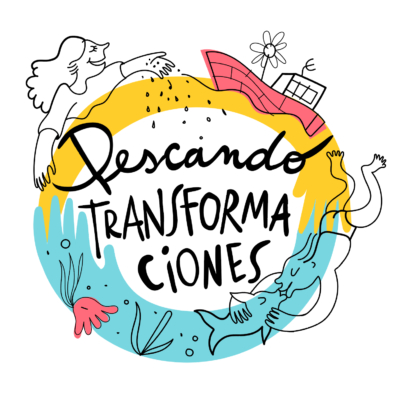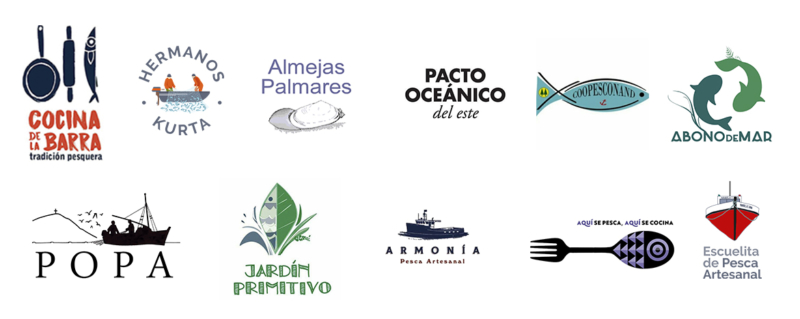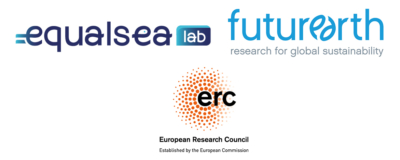Fishing Transformations
THE PROJECT

Small-scale fisheries are part of a food system that connects fishers, gastronomes, and consumers through the flavors and the pieces of knowledge of the seas, lagoons, and rivers. However, in Uruguay, small-scale fisheries face a paradox: local and sustainable fishing is more valued than ever, but fishers struggle to maintain their livelihoods and culture. In response, multiple actors linked to the local food system around small-scale fisheries are applying local solutions and articulating innovative initiatives to overcome this challenge.
The project “Fishing Transformations” (“Pescando Transformaciones” in Spanish) aims to co-create a transformative space by identifying and bringing together several innovative initiatives in small-scale fisheries in Uruguay and thus promoting the exchange of experiences, knowledge, and visions of the future. The co-creation of visions is a key element that serves as a collective objective in this project, driving actions in the present to move towards the desired future. To this end, the project involves various disciplines (Art, Transition Design, Sustainability Science) and socieal actors (Fishers, Gastronomes, Environmental Entrepreneurs, Researchers, Technicians) to promote collective learning, agency, creativity, and empowerment through diverse and plural approaches.
Fishing Transformations also seeks to be a platform for disseminating existing positive changes in local small-scale fisheries through the production and diffusion of communication pieces for broad audiences and interventions to promote small-scale fishing, its products, and its potential in the local gastronomy. In academic terms, the project seeks to empirically analyze the transformative potential of a coalescence process of innovative initiatives related to small-scale fisheries. This process aims to articulate new narratives and visions of the future towards more sustainable trajectories and thus challenge dominant narratives prone to sustaining the status quo and/or reproducing unsustainable practices.
GENERAL OBJECTIVE
Catalyze transformative changes in Uruguayan small-scale fisheries based on a transdisciplinary process of co-creation and collaboration between innovative initiatives.
SPECIFIC OBJECTIVES
- Map and systematize innovative initiatives of the food system associated with small-scale fishing.
- Generate a space for experiences and knowledge exchange, as well as the co-creation of plural and desirable visions for the future of small-scale fishing.
- Identify and promote necessary actions in the present to move towards desirable futures.
- Illuminate existing positive changes in local small-scale fisheries, through the production of communication pieces and activities.
MATERIALS
- The Small-Scale Fisheries Transformative Catalog
- The Small-Scale Fisheries Transformative Catalog (interactive version)
- Dialogue from innovative initiatives in small-scale fishing: tasting transformative changes in Uruguay
- “Fishing Recipes: A compendium of co-created recipes to inspire sustainable transformations with the small-scale fisheries as a beacon”
LEADING ORGANIZATIONS
● SARAS (South American Institute for Resilience and Sustainability Studies), Maldonado, Uruguay
● EqualSea Lab (Transformative Adaptation Towards Ocean Equity), Santiago de Compostela, Spain
ACADEMIC PARTNERS
INNOVATIVE INITIATIVES IN SMALL-SCALE FISHERIES OF URUGUAY
● Cooperativa Pesquera de Consumo de Andresito (COOPESCONAND), Andresito, Flores.
● Abono de Mar, La Paloma, Rocha.
● Grupo POPA, Piriápolis, Maldonado.
● Jardín Primitivo, Punta del Diablo, Rocha.
● Almejas Palmares, Palmares de la Coronilla, Rocha.
● Aquí se Pesca, Aquí se Cocina, Punta del Este, Maldonado.
● Pacto Oceánico del Este, Punta del Este, Maldonado.
● Cocina de la Barra, Laguna de Rocha, Rocha.
● Armonía, Punta del Este, Maldonado.
● Hermanos Kurta, Playa Verde, Maldonado.
● Escuelita de Pesca Artesanal, Punta del Diablo, Rocha.

FUNDING
● Project Consolidator Grant EQUALSEA (Transformative adaptation towards ocean equity) financed by the European Research Council (ERC) within the European Innovation Research Program Horizon 2020 (grant agreement No 101002784)
● Future Earth (Pathways Communication Grant) – Awarded project “The backstage of transformations: a case of envisioning small-scale fisheries futures in a Global South context”.
SARAS’ ROLE
- Host institution
EXECUTION PERIOD
Start: December 2019
CONTACT
● Ignacio Gianelli, EqualSea Lab, University of Santiago de Compostela, Spain (i.gianelli@usc.es)
● Micaela Trimble, Instituto SARAS, Uruguay (mica.trimble@saras-institute.org)
● Silvana Juri, Carnegie Mellon School of Design, Estados Unidos & Instituto SARAS, Uruguay (sjuri@andrew.cmu.edu)
● Sebastián Villasante, EqualSea Lab, University of Santiago de Compostela, Spain (sebastian.villasante@usc.es)

PRESS
DOCUMENTS
Transformative Changes in Small-Scale Fisheries: Visions and Actions for a Desired Future (Synthesis Report)
Only in Spanish
PUBLISHED
Tekoporá. Latin American Journal of Environmental Humanities and Territorial Studies. ISSN 2697-2719
Vol. 4 No. 1 (2022), Published August 6, 2022 “Transformative Economies”
“Interweaving the future: seeds of change in the artisanal fishery of Uruguay”
Ignacio Gianelli, Micaela Trimble, Sofia Rosa, Nazarena Ariadna Beretta, Ana Carolina Dias, Sebastián Villasante
Juri, S., Gianelli, I., & Trimble, M. (2023). Cocreando futuros para la pesca artesanal: El diseño de un proceso transdisciplinar en Uruguay. Revista Latinoamericana de Food Design (ReLAFD), 184–211.
Envisioning desirable futures in small-scale fisheries: a transdisciplinary arts-based co-creation process.
Gianelli, I., M. Trimble, S. Juri, N. A. Beretta, D. Torena, M. Acosta, R. Acosta, M. Del Bó, J. A. Fuster, V. González, D. Kurta, M. Kurta, T. López, M. E. Marfetán, P. Montes de Oca, A. Morales, V. Pardo, J. Sandoval, N. Schuch, C. Taroco, A. V. Norström, L. M. Pereira, and S. Villasante. (2024). Ecology and Society 29(1):20.
